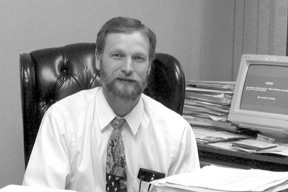 As a rural physician in Albion, Neb., John Mazour, M.D., not only takes care of the usual coughs and colds, he also delivers babies, is the attending emergency room physician and the medical director of several area nursing homes.
As a rural physician in Albion, Neb., John Mazour, M.D., not only takes care of the usual coughs and colds, he also delivers babies, is the attending emergency room physician and the medical director of several area nursing homes.
To say he’s busy is an understatement.
“Offering obstetrical and emergency department services are an important component of family practice and they require long hours, often at night,” said Dr. Mazour, one of five physicians at the Boone County Health Center.
Dr. Mazour is one of the first two physicians who completed the rural training residency program started by UNMC in 1990.
The UNMC rural residency program was conceived and developed by physicians in the department of family medicine, including current Chairman Michael Sitorius, M.D., and Associate Professor James Stageman, M.D.
The program is based on the concept that residents tend to practice within 100 miles of where they train. A network was then developed to have family practice residents train at key sites across Nebraska.
“I knew from the very start that I wanted to practice in a rural area because of my rural background,” said Dr. Mazour, who is from Nelson, a 600-person community about 50 miles south of Aurora. “I understand the concerns and needs of a rural population.”
Dr. Mazour said that while enrolled in the Rural Track program, he was assigned to the Boone County Health Center emergency department in Albion. While there, Dr. Mazour said, he observed the quality of care being provided and wanted to contribute his skills to the medical center once he graduated.
“Albion has allowed me the potential to grow a practice and have good working relationships with my medical peers,” Dr. Mazour said.
Not only does it fulfill his professional goals, he said, but it has also allowed Dr. Mazour and his wife to raise six children in a rural setting.
Since joining the health center, Dr. Mazour said the clinic has grown from two physicians to five with three physician assistants.
Besides his practice, Dr. Mazour also provides care at two other Boone County Health Center Clinics, serves as medical director for two of the many area nursing homes and is chief of staff at the Boone County Medical Center.
“I also continue to keep my connection with the rural track program by overseeing and teaching residents at the Doniphan clinic once a month,” Dr. Mazour said.
The rural track program is not only important to the communities the doctors serve in, he said, but it is also an enriching experience for those residents who choose to enroll in it.
“There is no better opportunity that I know of,” said Dr. Mazour, “that gives residents the ability to have an intense didactic experience combined with a huge volume of technical and procedural experiences suited for practice in rural areas.”
Dr. Mazour said that the program gave him the opportunity to practice in the context of families and communities, an important component for someone who is planning on practicing in a rural setting.
“With the vision, dedication and commitment of mentors like David O’Dell, M.D., and Richard Fruehling, M.D., the rural training program is a great success,” he said.
One of the blessings of practicing in a rural setting, he said, is that you become very close to the families and the communities.
That can also be a challenge when it comes to end of life issues.
“It can be tough,” said Dr. Mazour, “to balance the emotions of being a friend and the responsibility of being their physician.”
It can also be difficult to balance work and family in a rural setting where so many people depend on you, but Dr. Mazour would have it no other way.
“I consider it a privilege to be able to be a part of the joyful and sorrowful moments in the lives of my patients and their families.”